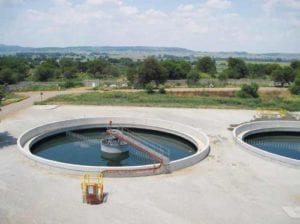An innovative system to utilise return effluent from the Cape Recife Waste Water Treatment Works (WWTW), is set to reduce demand on Port Elizabeth’s fresh water supply.
The system, designed by local firm Africoast Consulting Engineers, will significantly increase the water available for industrial and irrigation use. Through the system return effluent is treated, purified sewage water that, instead of being released back into nature or the ocean, is returned for industrial utilisation, irrigation and other uses. The water quality conforms to standards set by the Department of Water Affairs. AfriCoast Consulting Engineers project manager Gerrie van de Merwe said the firm’s professional responsibilities, aside from construction monitoring and project management, include “the physical designs of the pump station, rising main, balancing reservoir, gravity irrigation feeder pipeline, irrigation reticulation systems and measurement of usage.Cape Recife WWTW’s upgrade
“Cape Recife WWTW’s upgrade is currently under design. Once completed, the capacity of the treatment works will increase from a current maximum daily production of treated effluent of around 9 megalitres to a daily average of 18 megalitres, effectively meeting the demand for reclaimed irrigation water,” he said.“Currently, gardens and sports fields across the city are being irrigated with expensive, potable (drinking) water – an invaluable resource in the water-scarce Nelson Mandela Bay Metropolitan area. Borehole water is used to augment the supply of irrigation water, but that has negative environmental outcomes, including lowering the water table.
“Yet in the meantime, thousands of litres of useable, treated effluent are being discharged every day through a wetland system and into the ocean, in the vicinity of the Noordhoek Lighthouse.” The Cape Recife Return Effluent Scheme aims to utilise this currently wasted return effluent in lieu of the potable and borehole water used to irrigate the beachfront gardens and sports fields within economically viable reach. The concept was initiated with the NMBM Parks Department and Beach Managers. The beachfront, Port Elizabeth’s primary tourist attraction, currently uses potable water in flower beds but the grassed areas are not irrigated, leaving them less appealing than they could be.







